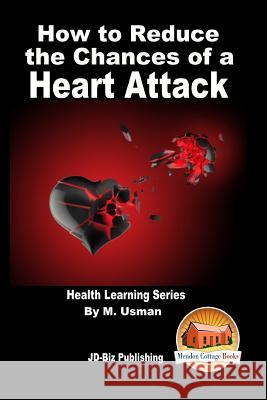How to Reduce the Chances of a Heart Attack - Health Learning Series » książka
How to Reduce the Chances of a Heart Attack - Health Learning Series
ISBN-13: 9781517731724 / Angielski / Miękka / 2015 / 48 str.
How to Reduce the Chances of a Heart Attack - Health Learning Series Table of Contents Introduction. Section one- Heart attack - an overview Heart attack - A crumbling of your heart. Symptoms - When you know it's coming... Risk factors - The heart breakers Grave prognosis -- Why you should bother trying to avoid a heart attack. Section Two- Reducing heart attacks Effective prophylaxis - an introduction Medication free strategies - Who needs a doctor? -Dietary changes -Say no to smoking -Regular exercise -Put a check on your weight. -Stress management -Herbal and nutritional supplements -Get regular check ups Medicines - Well, sometimes you do (need a doctor) -Anticoagulants -Antiplatelet agents -Statins -ACE inhibitors -Angiotensin receptor blockers -Diuretics -Beta blockers Work Plan - monitor your progress Conclusion References Introduction Imagine that you are breezing through life and life seems to be going so smoothly; you are so full of life that you do not even have the time to look after yourself, much less others. Visit to your doctor can wait, of course, because right now nothing is wrong with you. You are perfectly okay. And then one day you are running to congratulate your son, who has perhaps just graduated from his high school or maybe you are getting late for some appointment and suddenly, an excruciating pain arises in your chest and goes to your shoulder... you want it to subside but the pain keeps gripping you. You feel as if your life is at an end. But you don't want it to end. There is so much to do. But you can't stand on your feet anymore. You feel yourself falling, falling, falling and may be you won't wake up again. The above account describes heart attack in a nutshell. And according the American Heart Association, "About 7,250,000 Americans have a heart attack each year" So, it's quite common, common enough that someday I and you could encounter this situation too. However, it's not like we can't do anything about it. While there's no vaccine for heart attack, we can, however, significantly reduce the chances of getting a heart attack by making simple changes in our routines. This book will attempt to highlight the fact that you can, by knowing about heart attack and what risks it poses, make subtle changes in your routine and diet that will go a long way towards reducing the risk of heart attack. I must emphasize here, however, that this is no reference book and it can reinforce but cannot replace a good doctor's advice. So, while I assure you that you will find it very informative and helpful, do not rely solely on this book for curing a heart attack; instead consult a doctor as well. With this caution in mind, let us now first see what this heart attack, which takes away the lives of so many people each year, really is, before diving into what we can do to avoid it."
Zawartość książki może nie spełniać oczekiwań – reklamacje nie obejmują treści, która mogła nie być redakcyjnie ani merytorycznie opracowana.











